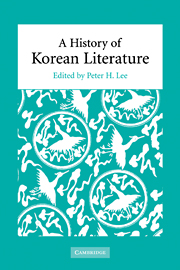Book contents
- Frontmatter
- Contents
- List of illustrations
- List of contributors
- Preface
- Note on the text
- Korean dynasties
- Glossary
- East Asia
- Principal places in works discussed
- Introduction
- 1 Language, forms, prosody, and themes
- 2 From oral to written literature
- 3 Hyangga
- 4 Silla writings in Chinese
- 5 Koryŏ songs
- 6 Koryŏ writings in Chinese
- 7 Early Chosŏn eulogies
- 8 Early Chosŏn sijo
- 9 Early Chosŏn kasa
- 10 Late Chosŏn sijo
- 11 Late Chosŏn kasa
- 12 Chosŏn poetry in Chinese
- 13 Chosŏn fiction in Chinese
- 14 Chosŏn fiction in Korean
- 15 P'ansori
- 16 Folk drama
- 17 Literary criticism
- 18 Early twentieth-century poetry
- 19 Early twentieth-century fiction by men
- 20 Early twentieth-century fiction by women
- 21 Late twentieth-century poetry by men
- 22 Late twentieth-century poetry by women
- 23 Late twentieth-century fiction by men
- 24 Late twentieth-century fiction by women
- 25 Literature of North Korea
- Bibliography
- Suggestions for further reading
- Index
19 - Early twentieth-century fiction by men
Published online by Cambridge University Press: 22 September 2009
- Frontmatter
- Contents
- List of illustrations
- List of contributors
- Preface
- Note on the text
- Korean dynasties
- Glossary
- East Asia
- Principal places in works discussed
- Introduction
- 1 Language, forms, prosody, and themes
- 2 From oral to written literature
- 3 Hyangga
- 4 Silla writings in Chinese
- 5 Koryŏ songs
- 6 Koryŏ writings in Chinese
- 7 Early Chosŏn eulogies
- 8 Early Chosŏn sijo
- 9 Early Chosŏn kasa
- 10 Late Chosŏn sijo
- 11 Late Chosŏn kasa
- 12 Chosŏn poetry in Chinese
- 13 Chosŏn fiction in Chinese
- 14 Chosŏn fiction in Korean
- 15 P'ansori
- 16 Folk drama
- 17 Literary criticism
- 18 Early twentieth-century poetry
- 19 Early twentieth-century fiction by men
- 20 Early twentieth-century fiction by women
- 21 Late twentieth-century poetry by men
- 22 Late twentieth-century poetry by women
- 23 Late twentieth-century fiction by men
- 24 Late twentieth-century fiction by women
- 25 Literature of North Korea
- Bibliography
- Suggestions for further reading
- Index
Summary
Modern Korean fiction was formed in the historical context of the new Western world order and the heightened sense of national independence that followed the breakup of the traditional Chosŏn society. The enlightenment and education movements were quite active during the first stage (mid-nineteenth to early twentieth centuries) of modern Korean literary history. Literary works of this period show dramatic change. The central characteristic was the formation of a vernacular literature influenced by the new movements. As Chinese literary influence declined, various literary forms using the Korean language expanded to the masses through newspapers such as the Independent (Tongnip shinmun), Capital Gazette (Hwangsŏng sinmum), Korea Daily News (Taehan maeil sinbo), Imperial Post (Cheguk shinmun), Independence News (Mansebo), and Korea People's Press (Taehan minbo). Another new movement urged writers to criticize contemporary reality and express enlightenment consciousness.
BIOGRAPHIES OF HEROES
Before any other narrative form of the enlightenment and education movements, we must discuss biography. Above all biography reflected a strong social consciousness that resisted foreign influence and sought independence. Biographies of the time offered the ideal heroic types that contemporary Korean society hungered for.
Aeguk puinjŏn (Life of a Patriotic Woman, 1907) by Chang Chiyŏn (1864–1921) depicted the life of Joan of Arc. Although the protagonist was the daughter of a poor peasant family, she participated in the struggle against foreign invaders. The main motivation for writing this work was to present a model of a heroine that appealed to patriotic feeling among Korean women.
- Type
- Chapter
- Information
- A History of Korean Literature , pp. 390 - 405Publisher: Cambridge University PressPrint publication year: 2003



